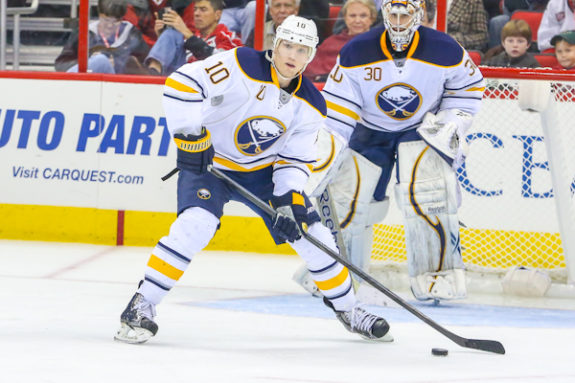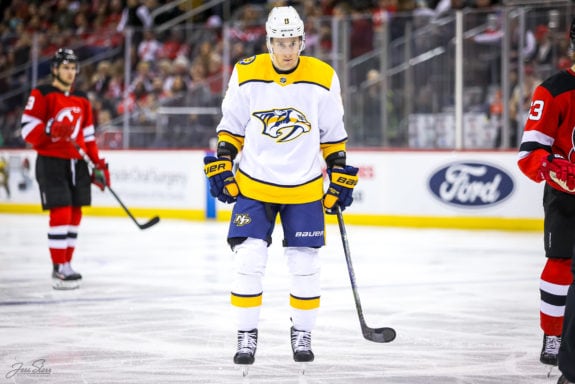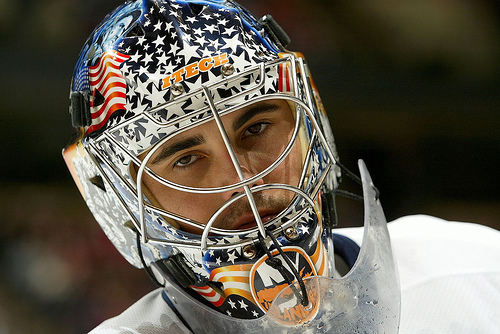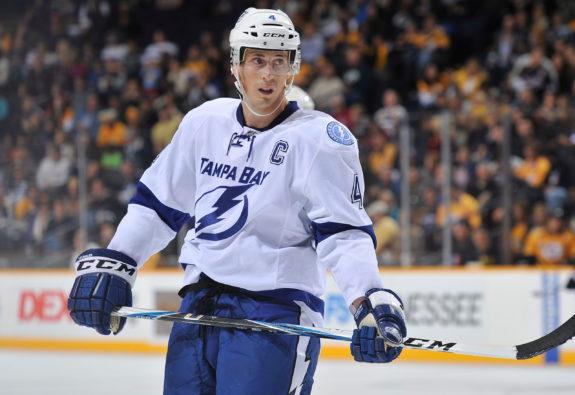It is always tough for a general manager to realize that the only way to get rid of a bad contract is to buy it out. Many NHL teams have gone this route, especially in a strict cap-compliant era. Unfortunately, GMs have had to eat bad contracts to ensure a positive future for their organization. Here are some of the highest-paid buyouts that were still on the books this season.
Christian Ehrhoff – Buffalo Sabres
Owed $857,143/year until 2027-28
German defenseman Christian Ehrhoff earned a 10-year, $40 million contract from the Buffalo Sabres in free agency in 2011. He had back-to-back seasons of 44 and 50 points while being a significant asset to the Vancouver Canucks’ playoff runs from 2009-2011. After his offensive production regressed in his three seasons with the Sabres, the team ultimately decided to part ways with the blueliner in the 2014-15 season.

After his contract was bought out, Ehrhoff played for two more seasons with three different teams, including Los Angeles Kings, Pittsburgh Penguins, and Chicago Blackhawks. After finishing his NHL career he played two seasons for Kolner Haie in the DEL league in his native Germany while still reaping the rewards of his buyout, thanks to a poor management decision by Sabres general manager Darcy Regier to give a 28-year-old a ten-year deal.
Kyle Turris – Nashville Predators
Owed $2,000,000/year until 2027-28
This is a more recent contract that didn’t pan out and led to a buyout, which was a tough pill for the Nashville Predators to swallow considering Turris’ potential and the effect his deal had on their cap situation in an already tough-to-manage market. The Predators acquired the centerman in a three-way trade with the Ottawa Senators and Colorado Avalanche in 2017-18, and he had a successful season in Nashville tallying 42 points in 65 games. The team then inked him to a six-year deal worth $6,000,000 AAV which quickly became overpayment, after he put up 23 points in 55 games in 2018-19 and 31 points in 62 games in 2019-20, and contributed very little in the postseason.

Turris is now double-dipping. After he was bought out by the Predators, he signed a two-year, $3.3 million deal signed with the Edmonton Oilers in 2020. However, he has continued to struggle and spent most of this season on the team’s taxi squad, playing only 27 games for the Oilers.
Related: Oilers Need Neal, Russell, Chiasson & Turris to Step up in the Playoffs
On the bright side, Turris made the most of his strong seasons and cashed in when a desperate Predators team was looking for answers at center, but he will need to boost his productivity and value if he wants to stay in the NHL.
Brad Richards – New York Rangers
Owed $1,055,556/year until 2025-26
This is a prime example of a team overpaying in free agency. The New York Rangers fell into the trap of making a long-term investment in a depreciating 31-year-old player. Richards isn’t to blame for signing a 9-year deal worth $60 million, which gave him security and value in the latter stages of his career. This deal is part of the reason there is now a limit on the length of a contract according to the recent Collective Bargaining Agreement, which should help prevent buyouts in the future.
While the Rangers had success with Richards, especially in the postseason, which included a Stanley Cup Final appearance in 2014, he was bought out after that season, and the team is still paying him even though he retired after the 2015-16 season after a stint with the Detroit Red Wings.
Ilya Bryzgalov – Philadelphia Flyers
Owed $1,642,857/year until 2026-27
The Flyers signed the Russian goaltender in June of 2011 after acquiring his rights from the then Phoenix Coyotes in the hopes of solving their struggles in the crease. Philadelphia was forced to move forwards, Mike Richards and Jeff Carter to make room for Bryzgalov and his nine-year deal worth $51 million. He had respectable regular-season numbers with the Flyers but only made the postseason once in one of his two seasons with the club and did not play well.
He was bought out by Philadelphia after the 2013-14 season and made brief stops with the Minnesota Wild, Anaheim Ducks, and Oilers before he retired following the 2014-15 season. This is another long-term deal signed under the old CBA that went sour and left the Flyers on the hook for $23 million to be paid over a 14-year span.
Rick DiPietro – New York Islanders
Owed $1,500,000/year until 2028-29
For someone who only played 318 games in the NHL, the American goaltender cashed in big. The former first-overall selection in the 2000 NHL Draft signed a monster 15-year contract with the New York Islanders as a restricted free agent ahead of the 2006-07 season. The Islanders tried to lock up their starting goaltender for the foreseeable future at a number that would be a bargain if DiPietro had lived up to his potential. Unfortunately, this deal went terribly wrong after DiPietro’s injury troubles limited his play early on.

In his last five seasons in the league, he played a combined 50 games and never had a save percentage better than .900. Former Islanders goaltender Garth Snow was the one responsible for handing out the contract, and although he had the right idea in trying to get a top-end talent on a bargain contract, there is always a risk involved in investing in a player for such a long time. This is an NHL contract that we will likely never see again, no matter how many new CBAs are negotiated in the future.
Vincent Lecavalier – Tampa Bay Lightning
Owed $1,761,905/year until 2026-27
The former Tampa Bay Lightning captain was 29 years old when he signed his 11-year, $85 million extension with the club that drafted him. This deal was flawed from the get-go considering that Lecavalier would have been 40 years old at the end of it and still making $7,727,272 per season. Despite bringing a Stanley Cup to Tampa Bay in 2004, the team was eventually forced to move him during the 2013-14 season due to cap constraints.

The Quebec native continued his career in Philadelphia while still being paid by the Lightning organization. He has been reaping the rewards of this buyout since he retired in 2016. I’m not sure there is a better retirement gift than collecting $1,761,905 in salary per year for years after you’ve been out of the game.
Lesson Learned
Most of these buyout contracts were caused by poor management decisions with little consideration as to how they would affect the future of the franchise. The current CBA determined that the maximum length of a contract can be eight years, which has helped regulate the term handed out to players signing new deals.
Related: EA Sports NHL 21: Stanley Cup Playoffs Simulation
While contracts will still be bought out, the length that a franchise will have to pay a player after they’ve left the club has decreased significantly and, with a tight salary cap world, general managers have become more aware of and less willing to risk the long-term future of their organization.